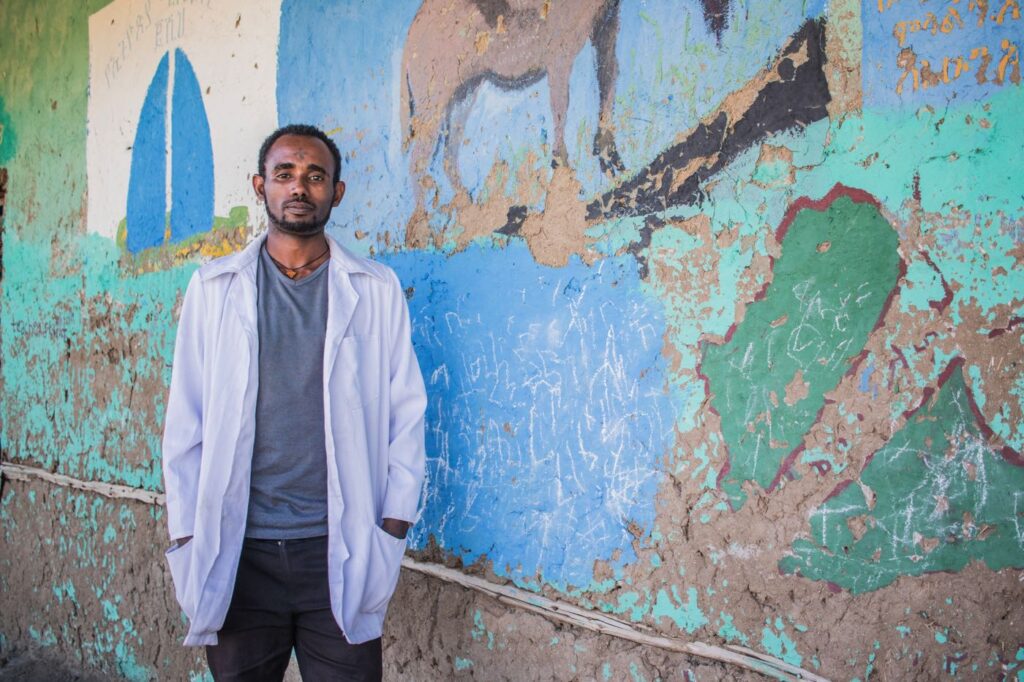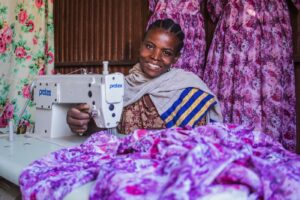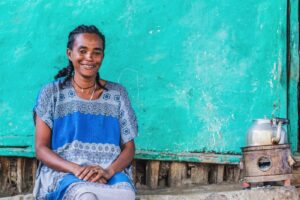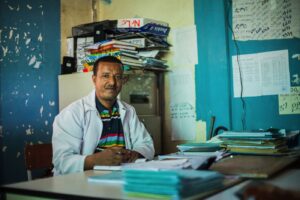Degib Gula Middle School sprawls across an open piece of land in Degib kebele, East Belesa woreda in the Central Gondar zone. It’s the only school for kilometers with students walking for up to two hours to come attend. Since its establishment by the woreda 16 years ago, the school has fallen victim to the same scarcity of clean water supply that has plagued Degib kebele since time immemorial. It was not until SWEEP, a project implemented by CARE through the financial support of the Austrian Development Agency, constructed a solar powered water supply system that the community, including pupils of the school, felt the relief of easy access. SWEEP, as part of its objective, aims to increase household access to water in targeted woredas by building up capacities to implement sustainable water resource management and environmental conservation practices in the communities.
The effect of the lack of clean water supply for a school may not seem significant, but the impact has been tremendous on Degib Gula. Yeshambel Gebre, vice principal, describes a somber time for the school, “Because of their long walk to school, the students arrive already tired and we have no water to give them. It would not even be possible for them to wash their hands. We would lose half the students by recess because they either want to go looking for water or they are too tired to stay in class.” This was not without its effect on the students’ performance in school. “Participation was low, and it was becoming increasingly difficult to engage the interest of the students. It’s hard to blame them, even us teachers were struggling through the day not just because there was no clean water to drink, but keeping basic personal hygiene is near impossible without water,” adds Teshome Kassa, a teacher at Degib Gula who has lived in Belesa all his life.
The pain of the lack of water was doubly pronounced for female students who account for more than half of the entire school population. “We experienced the same thing as other students, but as girls, we would have no way to care for our basic hygiene especially during menstruation,” says Samrawit Mekonen, a 20 year-old finishing up 8th grade at Degib Gula. Female students would often leave school early or not show up at all if they were menstruating simply because there was no water access and a lack of adequate latrines. Their grades would suffer, and the psychological toll of choosing between being ridiculed in school if they stain their clothes or staying home and skipping class is also shouldered by female students.
Samrawit is part of the Girls’ Club at Degib Gula School which is headed by Yeneneh Lingerih, the 5th and 6th grade science teacher. Within the club, the conversation around hygiene has grown more robust since the installation of the water reservoir system. Because the girls can now implement the knowledge Yenenesh is imparting, they are all ears when she shares what she knows during their meetings. “There was a time when we had completely dissolved the club. Students complained that the discussions were irrelevant to them. But now, not only are they avid listeners, but they are also active participants of Monday Cleaning, a weekly program the school hosts to educate and instill the values of cleaning,” says Yenenesh. She also notices student absence has dramatically decreased for both male and female students. The water supply and easy access within the school also gives an opportunity for personal hygiene especially for students who live in areas with no access to clean water but commute to Degib Gula for school.
Since the installation of the water reservoir system, things have been looking up in the school and in Degib kebele in general. The clean water supply post within the school compound is often bustling with kids drinking their fill and washing their hands and faces. SWEEP also installed additional latrines for the school which are fitted with water supply for maximum hygiene and sanitation. This has created safe and accessible space especially for female students to maintain their dignity and hygiene.
Teachers like Teshome and Yenenesh who live in the area also feel the relief in their lives and households. Where they previously paid for water to be brought to their homes from other kebeles, both Teshome and Yenenesh now have clean water supply right at their doors. “We have certainly felt the relief,” says Yenenesh, “Water is everything and it is doubly important that children grow up with the proper understanding of hygiene and sanitation. What we tell them about keeping personal hygiene or cleanliness in the home or even when cooking, it makes sense to them now because there is water!”







